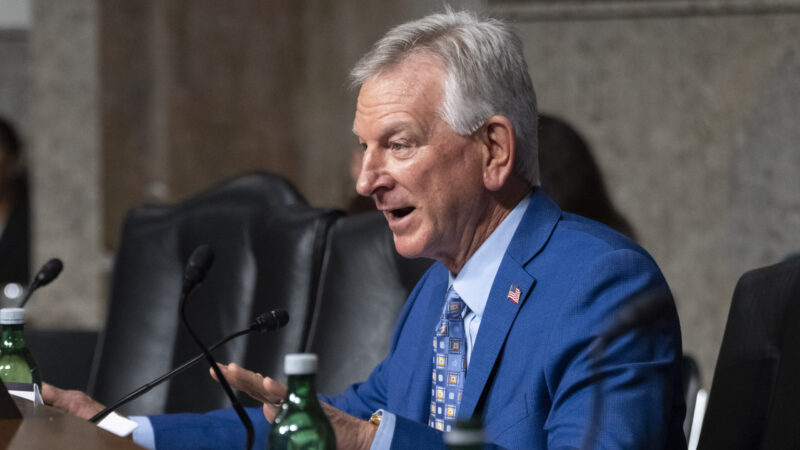Tuberville under pressure from Republicans over military holds
Sen. Tommy Tuberville, R-Ala., questions Navy Adm. Lisa Franchetti during a Senate Armed Services Committee hearing on her nomination for reappointment to the grade of admiral and to be Chief of Naval Operations, Sept. 14, 2023, on Capitol Hill in Washington.
By Mary Clare Jalonick and Kevin Freking
WASHINGTON (AP) — Alabama Sen. Tommy Tuberville said he’s open to negotiating an end to his blockade of almost 400 military nominees after meeting with fellow Republican senators on Tuesday, signaling a shift after he has dug in on his protest of a Pentagon abortion policy for more than nine months.
The unusual meeting called by GOP senators to challenge one of their own comes after a handful of Senate Republicans held the floor for more than four hours last week in frustration, calling up 61 of the military nominations only for Tuberville to stand up and object every time. The Senate has traditionally approved large groups of military nominations by voice vote, but just one senator’s objection can upend that process.
Tuberville said he would work with other senators on possible options, and “hopefully we can start moving forward.” That was a contrast to last week, when he said there was “zero chance” he would lift the holds, absent a change in policy. But it was still unclear how a resolution could happen.
Republicans who have criticized Tuberville have suggested they may try and persuade him to hold up civilian nominees instead of the military nominations or take legal action against the department. They have also said they will also try to force more votes on nominations if he doesn’t lift the holds.
Tuberville proposed other options in a memo he circulated before the meeting, including Congress passing legislation that would block the abortion policy or the Defense Department rescinding it — both unlikely scenarios that he has suggested before.
At issue are new Pentagon rules that allow reimbursement for travel when a service member has to go out of state to get an abortion or other reproductive care. President Joe Biden’s administration instituted the new rules after the Supreme Court overturned the nationwide right to an abortion, and some states have limited or banned the procedure.
“I went in with one or two options. I’ve come out with five or six,” he said after the meeting. He also suggested he might let a small number of the nominations go through.
“There’s going to have to be some give-and-take,” Tuberville said.
Republicans leaving the meeting said there were still no real answers. “Still looking for a solution,” said Iowa Sen. Chuck Grassley.
Republicans held the meeting as Senate Democrats are considering a resolution that would allow batches of military nominees to be passed over Tuberville’s objections — a temporary measure that Republicans worry could erode their minority powers in the Senate.
The resolution by Senate Armed Services Committee Chairman Jack Reed, D-R.I., and Independent Sen. Kyrsten Sinema of Arizona to provide for batch consideration of military nominations will be before the Senate Rules Committee next week. Reed said he believes that if the impasse isn’t resolved by then, a “number of Republicans will be ready to support the resolution.”
Senate Majority Leader Chuck Schumer has said that “patience is wearing thin” with Tuberville’s nine-month-old blockade and that Democrats “will do everything we can to get it done.”
Senior military officials have warned repeatedly that the situation threatens readiness and national security. Defense Secretary Lloyd Austin said last week that the delays are hurting readiness and have “unnecessarily weighed down our military families, who already give up so much to support those who serve.”
The Republican senators have all said they disagree with the abortion policy, as well. But some of them have argued that Tuberville’s protest is misguided.
“It’s time to develop a new and smarter strategy,” said Republican Sen. Todd Young of Indiana, who served in the Marine Corps and was one of the senators who criticized Tuberville’s blockade on the Senate floor.
Leading the confrontation on the Senate floor last week were Alaska Sen. Dan Sullivan, a colonel in the U.S. Marine Corps Reserve, and Iowa Sen. Joni Ernst, a former commander in the U.S. Army Reserve and Iowa Army National Guard. The two Republican senators read out the officers’ credentials, praised their military service and lashed out at Tuberville as he sat quietly and alone, standing to object each time. At one point, Sullivan called the blockade a “national security suicide mission.”
The two senators said as they were leaving the meeting that the conversation had been constructive. “The conference laid out a number of alternatives” for Tuberville, Ernst said. “He’s got to evaluate those.”
The candy heir vs. chocolate skimpflation
The grandson of the Reese's Peanut Butter Cups creator has launched a campaign against The Hershey Company, which owns the Reese's brand. He wants them to stop skimping on ingredients.
Scientists make a pocket-sized AI brain with help from monkey neurons
A new study suggests AI systems could be a lot more efficient. Researchers were able to shrink an AI vision model to 1/1000th of its original size.
U.S. evacuates diplomats, shuts down some embassies as war enters fourth day
The United States evacuated diplomats across the Middle East and shut down some embassies as war with Iran intensified Tuesday while President Trump signaled the conflict could turn into extended war.
North Carolina and Texas have primary elections Tuesday. Here’s what you need to know
The midterm elections are officially underway and contests in Texas and North Carolina will be the first major opportunity for parties to hear from voters about what's important to them in 2026.
Kristi Noem set to face senators over DHS shutdown, immigration enforcement
The focus of the hearing is likely to be on how Kristi Noem is pursuing President Trump's mass deportation efforts in his second term, after two U.S. citizens were killed by immigration officers.
College students, professors are making their own AI rules. They don’t always agree
More than three years after ChatGPT debuted, AI has become a part of everyday life — and professors and students are still figuring out how or if they should use it.








